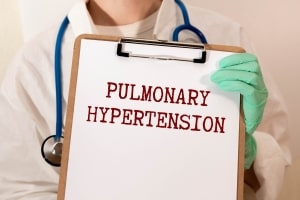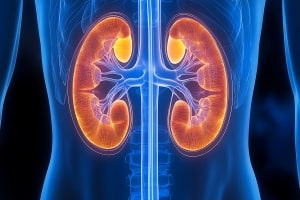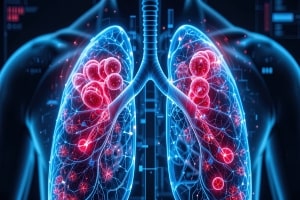 Pulmonary hypertension is a condition in which high blood pressure is localized to the arteries that move blood from your heart to your lungs. However, this condition doesn’t stay confined to your cardiovascular system. Rather, it sets off a chain reaction that impacts multiple organs throughout your body. Being aware of these effects helps you identify symptoms early and get treated.
Pulmonary hypertension is a condition in which high blood pressure is localized to the arteries that move blood from your heart to your lungs. However, this condition doesn’t stay confined to your cardiovascular system. Rather, it sets off a chain reaction that impacts multiple organs throughout your body. Being aware of these effects helps you identify symptoms early and get treated.
The Heart Is Most Affected
Your heart works harder when you have pulmonary hypertension. The right side of your heart must pump blood through narrowed arteries, which puts extra strain on the heart muscle. This extra work leads to your right ventricle getting larger and thicker over time.
The enlarged heart muscle becomes less efficient at pumping blood. Eventually, this results in right-sided heart failure, where your heart can’t pump blood effectively to your lungs. When this happens, blood backs up throughout your body’s circulatory system.
You may also develop irregular heart rhythms referred to as arrhythmias. These can cause your heart to beat too slowly, too quickly, or irregularly.
Your Liver Gets Congested
Right-sided heart failure directly impacts your liver. When your heart functions inefficiently, blood backs up in the veins that drain your liver. This backup causes your liver to swell and lose efficiency.
You’ll likely feel pain or discomfort in the upper right part of your abdomen as your liver enlarges. The congestion also affects your appetite. You may feel full after eating small amounts or lose interest in food altogether. Some people develop fluid buildup in their abdomen, which makes eating even more uncomfortable.
Your liver processes toxins and produces proteins your body needs. When it’s congested, these functions decline, which affects your overall health.
Kidney Function Declines
 Your kidneys filter waste from your blood and control fluid balance in your body. When pulmonary hypertension causes heart failure, less blood reaches your kidneys. This reduced blood flow makes it more challenging for your kidneys to work effectively.
Your kidneys filter waste from your blood and control fluid balance in your body. When pulmonary hypertension causes heart failure, less blood reaches your kidneys. This reduced blood flow makes it more challenging for your kidneys to work effectively.
The decreased kidney function leads to fluid retention. You’ll notice swelling in your legs, ankles, and abdomen. This swelling occurs because your kidneys are unable to remove excess salt and water from your system effectively.
As kidney function continues to decline, the fluid buildup worsens, causing additional strain on your already overworked heart.
Oxygen Delivery Problems Affect Everything
Pulmonary hypertension reduces how efficiently blood flows through the lungs and becomes oxygenated because narrowed pulmonary arteries limit how much blood reaches the lung’s air sacs. As a result, less oxygen enters the bloodstream, especially during physical activity.
You may also develop anemia for several reasons, including inflammation that disrupts iron absorption and utilization, low iron stores, kidney-related changes in red blood cell production, or blood loss, each of which can reduce healthy red blood cell production. The combination of poor circulation and reduced oxygen creates a cycle in which your organs don’t receive what they need to function normally.
This oxygen shortage contributes to the fatigue and weakness that people with pulmonary hypertension experience. Your exercise tolerance decreases because your body can’t get enough oxygen to your muscles as you engage in physical activity.
Brain Function Changes
Your brain uses about 20% of your body’s oxygen supply. When pulmonary hypertension reduces oxygen levels in your blood, your brain doesn’t get enough oxygen to work at full capacity. This can result in challenges with memory, mental clarity, and concentration.
Reduced blood flow to the brain can result in dizziness or fainting episodes, particularly when you stand up quickly or exert yourself.
Some people experience headaches related to changes in blood pressure and oxygen levels. These neurological symptoms often worsen as pulmonary hypertension progresses.
Metabolism and Hormones Get Disrupted
Pulmonary hypertension may also affect how your body produces and uses energy. The chronic stress resulting from the continuous strain your heart and lungs undergo may interfere with the hormones that help regulate your metabolism.
As a result, you may feel lethargic, have trouble maintaining normal blood sugar levels, or notice unpredictable changes to your appetite and energy levels.
These metabolic symptoms make it difficult to maintain your weight and energy levels, which in turn affect your quality of life.
Infections Become Riskier
 Chronic pulmonary hypertension makes respiratory infections more dangerous because strain on the heart and lungs reduces the body’s ability to cope. Thus, symptoms can worsen quickly.
Chronic pulmonary hypertension makes respiratory infections more dangerous because strain on the heart and lungs reduces the body’s ability to cope. Thus, symptoms can worsen quickly.
When infections do occur, they can exacerbate breathing difficulties and increase stress on the right side of the heart, potentially worsening pulmonary hypertension and slowing recovery. It’s essential to limit exposure to individuals who may have a contagious respiratory condition when possible and stay up to date on recommended vaccines to lower the risk of severe illness.
Get Expert Care from Imperial Center Family Medicine for Complex Conditions
The Imperial Center Family Medicine team understands how pulmonary hypertension affects the entire body, not just the heart and lungs, and provides thorough monitoring to catch complications early, before they become serious problems.
Our experienced providers work closely with specialists to make sure that all aspects of your health affected by this complex condition receive proper attention and treatment. Contact us today at 919-873-4437 or online, and our team will work with you to develop a personalized plan to help treat your pulmonary hypertension and minimize its impact on the rest of your body.
